Faisalabad, originally named Lyallpur, traces its origins back to the late 19th century during the British colonial era. Founded with the vision of serving as a market town, the city rapidly evolved into an industrial center, playing a pivotal role in Pakistan’s economy. The city’s initial development was underpinned by its strategic location and fertile land, making it an attractive destination for agricultural and later industrial activity.
Understanding the early origins and historical events of Faisalabad provides insights into its development as an industrial giant in Pakistan. The following sections will delve deeper into the various aspects of Faisalabad, exploring its economic significance, cultural heritage, and future prospects.
Historical Background
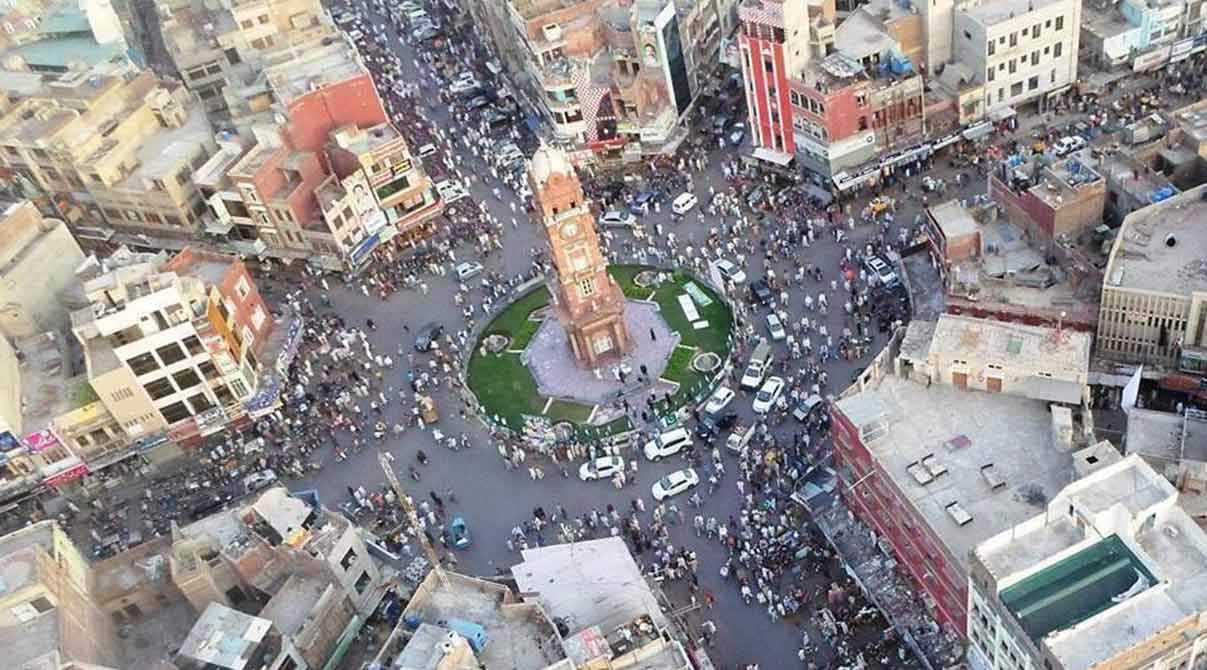
Before the bustling city of Faisalabad came into existence, early communities in this region were primarily engaged in agriculture, benefiting from the fertile soil of the region. The patchwork of these settlements subtly laid the groundwork for what would eventually blossom into one of Pakistan’s industrial epicenters. The transformation from a serene agricultural landscape to an industrial giant began with a vision during the British colonial period, marking the inception of a city destined for economic prominence.
In 1892, the British colonial administration, acknowledging the region’s potential, decided to craft a new town named Lyallpur, after the then Lieutenant Governor of Punjab, Sir James Lyall. The town was meticulously planned with a unique layout designed by Captain Poham Young, resembling the Union Jack. This design facilitated the development of a robust market town, attracting entrepreneurs and settlers, and set the stage for Lyallpur’s evolution into a prominent industrial and commercial hub in the years to come.
The renaming of Lyallpur to Faisalabad in 1979 was more than a mere change of letters; it was a reflection of the cultural and political shifts sweeping through Pakistan. The new name was a tribute to King Faisal of Saudi Arabia, a steadfast friend and ally of Pakistan. This renaming symbolized a departure from the colonial past and a step towards forging a distinct identity, aligning with the Islamic solidarity and national sentiments prevalent during that era.
Geographical Location
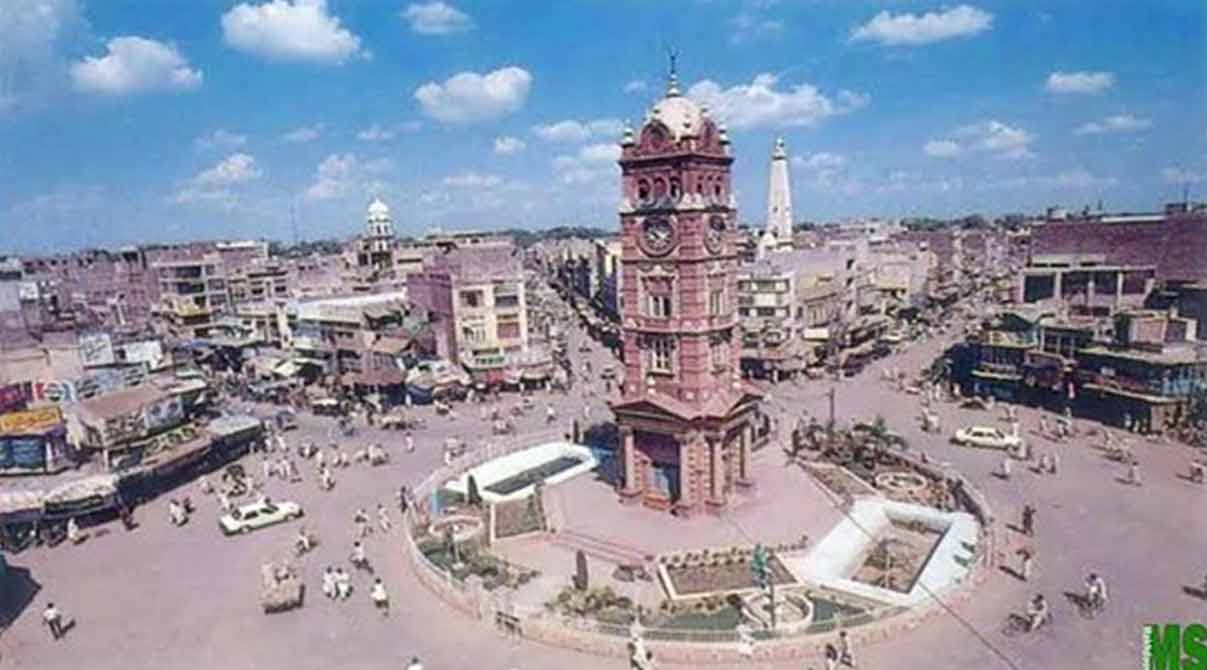
Faisalabad comfortably sits in the northeastern part of the Punjab province of Pakistan, serving as a testament to strategic geographical planning. Nestled at the heart of the country, the city enjoys a central location that seamlessly connects it to major cities and trade routes, making it a focal point of commercial and industrial activities in Pakistan.
With a well-laid network of roads, railways, and airports, Faisalabad’s location is nothing short of a logistical dream. The city is efficiently linked to major urban centers, including Lahore, Islamabad, and Karachi. This intricate web of connectivity not only facilitates the movement of goods and services but also fosters economic cooperation and synergy among the various regions of the country. In Pakistan’s economic landscape, Faisalabad is strategically placed, serving as a crucial junction that fuels trade and industry.
Trade and Industry Hub
Faisalabad’s geographical positioning is akin to a gateway that opens doors to unparalleled trade and industrial opportunities. Its location offers easy access to seaports, enabling smooth import and export activities crucial for the textile industry.
Additionally, the city’s proximity to the agricultural heartland of Pakistan provides the textile mills with a steady supply of raw materials, thereby sustaining the cycle of production and trade. In the realm of industry and commerce, Faisalabad stands as a veritable gateway to prosperity, channeling trade flows and acting as a magnet for industrial activities.
Strategic Advantage
Location is the invisible hand guiding the market, and in Faisalabad’s case, this hand deftly navigates the city towards industrial success. The city’s geographical advantage is not merely a matter of convenience; it is a strategic asset that underpins its role as an industrial powerhouse.
With logistics playing a crucial role in the modern economy, Faisalabad’s strategic location offers reduced transportation costs and time, efficient distribution networks, and swift access to international markets, fortifying its position as an indispensable center of trade and industry in Pakistan.
Earning the Nickname – The Manchester of Pakistan
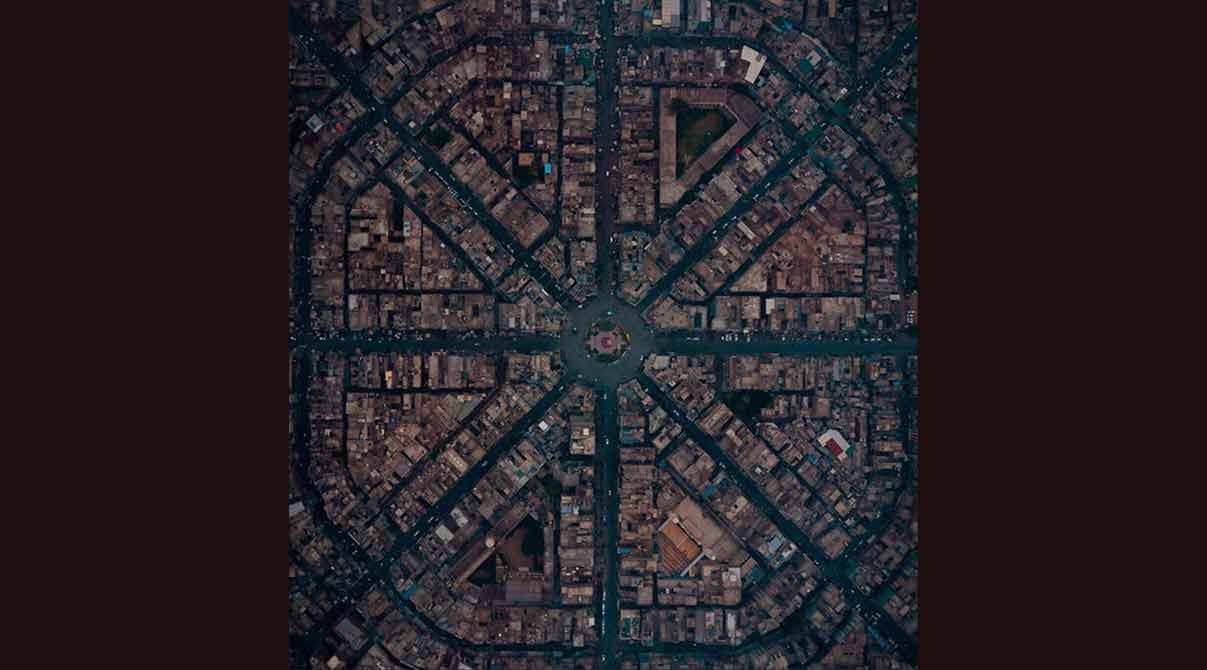
In the records of industrial history, Faisalabad carved its niche, earning the nickname “The Manchester of Pakistan”. This wasn’t a title easily earned; it was bestowed upon the city due to its colossal and dynamic textile industry.
Much like its namesake in the UK, which during the throes of the Industrial Revolution became synonymous with textiles, Faisalabad mirrored this image, albeit in a different part of the world. The city not only housed an array of textile mills and factories but also significantly bolstered Pakistan’s textile exports, becoming an indispensable cog in the nation’s economic machinery.
The comparison between Faisalabad and Manchester isn’t merely poetic; it’s grounded in the economic and industrial realities shared by the two cities. Both emerged as the textile titans in their respective countries, weaving not just fabric but also the narrative of economic prosperity and industrial triumph.
Additionally, like Manchester, Faisalabad has numerous educational institutions dedicated to textile research and engineering, further cementing its position as an industrial hub. In the grand economic tableau, both cities stand tall as contributors to their nations’ GDPs, testifying to their roles as economic powerhouses.
Related: University of Agriculture Faislabad
Economic Significance
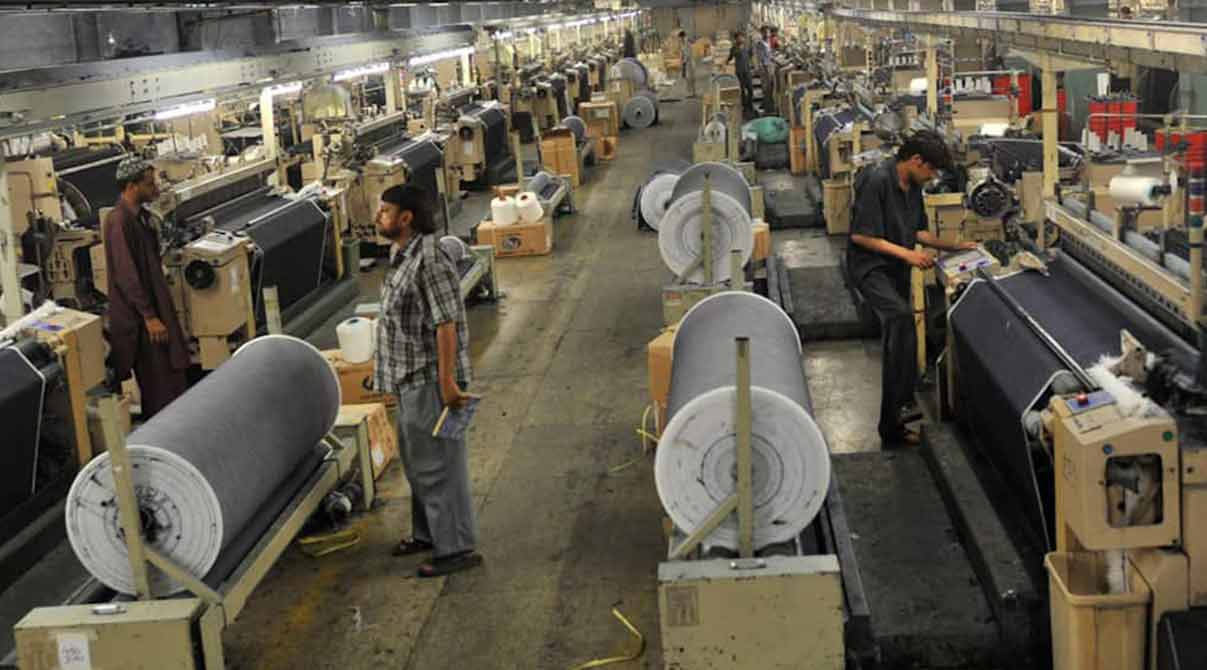
Faisalabad stands as a beacon of economic vitality in Pakistan, showcasing a dynamic and diversified economic landscape. While the city is globally renowned for its textile industry, it is also a nexus of various other sectors that collectively drive its economy forward. The economic tapestry of Faisalabad is intricately woven with threads of manufacturing, agriculture, services, and trade, making it a significant contributor to the nation’s economic output.
Diversifying Economic Canvas
In the economic symphony of Faisalabad, the textile industry plays the lead, acting as the hub that holds the city’s financial framework together. While textiles undoubtedly paint a significant part of Faisalabad’s economic canvas, there are other vibrant colors at play. The city boasts a thriving manufacturing sector that includes food processing, chemical production, and engineering.
Each of these sectors plays a crucial role in bolstering the city’s economy, providing employment, and contributing to the overall economic stability and growth. Additionally, the agricultural sector remains integral, supplying raw materials to various industries and supporting the livelihoods of many residents.
Sectors Working in Harmony
Faisalabad’s economic strength lies in the harmonious interplay between its various sectors. The textile industry, while dominant, is complemented by the other sectors that collectively create a resilient and robust economic environment. For instance, the agricultural sector supplies the textile industry with raw materials like cotton, while the engineering and chemical sectors provide necessary machinery and inputs. This interaction fosters an ecosystem where industries support and strengthen each other, crafting a resilient and diversified economic landscape in Faisalabad.
Textile Industry in Faisalabad

Faisalabad’s textile industry has experienced a transformative journey, evolving from humble beginnings to becoming a global contender in textile production. The city’s initial days were characterized by small-scale weaving and spinning units, which steadily grew and expanded in scale. Noteworthy achievements include the inception of the initial textile mills in the early 20th century, the infusion of investments and technological advancements in the post-independence era, and the city’s emergence as a crucial player in the global textile market.
Leading Textile Mills in Faisalabad

Faisalabad proudly hosts numerous textile mills and factories, each playing a pivotal role in the city’s thriving economy. Some of the prominent ones include:
Chenab Limited
Renowned for its diverse product range, Chenab Limited stands out for its substantial scale and impressive production capacity. This company caters to both local and global markets with a varied array of textile products.
Nishat Mills
As one of Pakistan’s foremost textile companies, Nishat Mills boasts a considerable production capacity. It specializes in crafting high-quality cotton yarn, greige fabrics, and apparel.
Sitara Group
Specializing in spinning, weaving, and textile processing, Sitara Group has distinguished itself as a leading provider of top-quality products tailored to diverse market segments.
Chawla Enterprises
Recognized for its steadfast commitment to quality, Chawla Enterprises has earned a solid reputation in the textile industry. The company manufactures a wide range of products that consistently meet local and international standards.
Rashid Textile Printing Industries
A trailblazer in textile printing, Rashid Textile Printing Industries has played a pivotal role in introducing innovative printing techniques and designs to meet the ever-evolving demands of the market.
Saab Weaving Textile Mills
Specializing in weaving, Saab Weaving Textile Mills offers a comprehensive range of textile products. With a focus on quality and innovation, the company has been able to establish a strong presence in the competitive textile industry.
H.J Textile Mills
With a legacy of producing premium quality textiles, H.J Textile Mills is famous for its state-of-the-art machinery and skilled workforce, which together deliver products in high demand across diverse markets.
Kausar Textile Industries Pvt Ltd.
Kausar Textile Industries is dedicated to producing high-quality yarn and other textile products. Emphasizing sustainability and innovation, the company plays a vital role in upholding industry benchmarks.
Okara Corporation Pvt Ltd.
With a focus on crafting and exporting top-notch textile products, Okara Corporation stands out for its unwavering commitment to prioritizing customer satisfaction and delivering exceptional value to clients worldwide.
These textile mills in Faisalabad, distinguish themselves through their scale, production capacity, and contribution to the textile market, both nationally and internationally.
Impact on Domestic and International Markets
Faisalabad’s textile industry has not only fortified the domestic market but also spun a web of influence across international borders. The city is a major exporter of quality textiles, earning valuable foreign exchange for Pakistan. With products ranging from yarn to finished garments, Faisalabad’s textile industry has marked its presence in major international markets, with notable exports to Europe, North America, and Asia.
Related: Top 10 Historical Places of Pakistan
Education and Research Institutions

Faisalabad, with its vibrant economic activities, boasts an equally dynamic educational landscape that supports and nourishes its workforce and industries. The city is home to numerous schools and higher education institutions that not only impart quality education but also actively participate in fostering a skilled labor force essential for the diverse industrial sector of the city.
Specialized Institutions for Industry Support
Given the city’s reliance on the textile industry, Faisalabad chiefly houses universities and institutions with a strong focus on textiles, engineering, and related fields:
- National Textile University (NTU): NTU is a premier institution for textile education in Faisalabad. It offers specialized programs in textile engineering, design, and management, producing graduates who are ready to make significant contributions to the textile industry.
- University of Agriculture, Faisalabad (UAF): Although primarily an agricultural university, UAF offers programs and conducts research that directly supports the textile industry, such as in textile and apparel merchandising.
- Government College University Faisalabad (GCUF): GCUF offers a diverse range of programs including those in applied chemistry and technology, which play a supportive role to the textile and chemical industries in the city.
These institutions not only contribute to education but are also engaged in pioneering research that supports and drives innovation in the local textile industry.
Bridging Academia and Industry
The education and research institutions in Faisalabad actively collaborate with the local industry to foster innovation and sustainability. Through various initiatives and partnerships:
- Industry-Academia Linkages: The universities in Faisalabad have forged robust connections with the industry. These collaborations enable the flow of knowledge, foster research and innovation, and play a crucial role in the education and employment of students in prominent industrial enterprises.
- Research and Development Centers: Universities such as NTU are home to specialized research and development centers exclusively focused on textiles. They provide consultancy and research services to the industry, playing a pivotal role in driving product development and fostering innovation.
- Training and Skill Development Programs: The universities and colleges in Faisalabad offer various training and skill development programs in collaboration with industry partners to enhance the skills of the workforce, making them ready for the challenges of the modern industrial environment.
Cultural Heritage
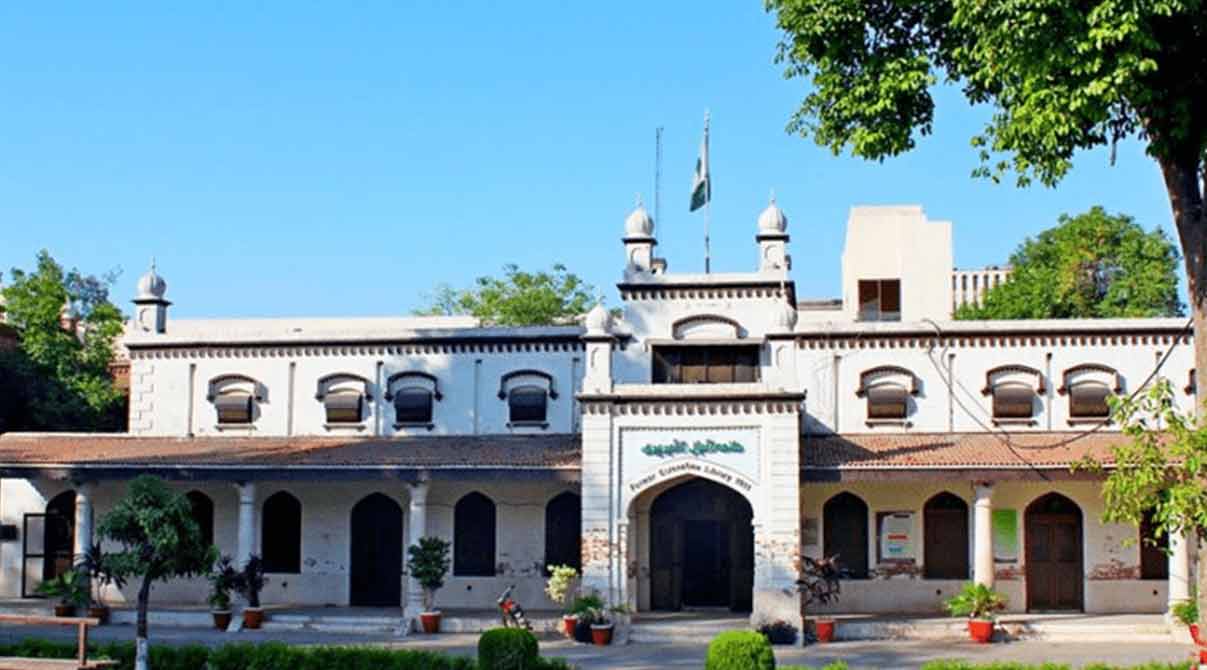
Faisalabad is a vibrant blend of rich history and diverse cultures, offering a tapestry of traditions brought by various ethnic groups over the years.
Landmarks
The city boasts landmarks like the iconic Clock Tower (Ghanta Ghar), a symbol of its colonial past and a central point for its lively markets. The Iqbal Stadium, in particular, named after the revered poet Allama Iqbal, serves as a crucible for the cricket passion encapsulating the nation, hosting numerous significant matches over the years.
Moreover, the Lyallpur Museum provides a unique glimpse into Faisalabad’s historical and cultural journey, offering visitors insight into the lives and industries that have shaped the city. The museum stands as a testament to the city’s dynamic identity, showcasing a range of exhibits and displays narrating the tales of Faisalabad’s past and present.
Festivals and Events
The city serves as a backdrop for a variety of festivals and events that commemorate its cultural legacy and industrial achievements. For instance, the National Industrial Exhibition stands out as a platform for local businesses to exhibit their products and establish valuable connections. Literary and cultural festivals further brighten the city’s annual calendar. They honor Faisalabad’s intellectual and artistic vitality and offer a platform for local writers, artists, and thinkers.
Furthermore, traditional celebrations such as Eid, Diwali, and Christmas are observed with great fervor and happiness. They reflect the city’s inclusive and diverse cultural character. In essence, Faisalabad is more than just an industrial center. It is a living tapestry woven from diverse cultures, traditions, and histories. All celebrate a heritage as deep and lively as the city itself.
Current Challenges
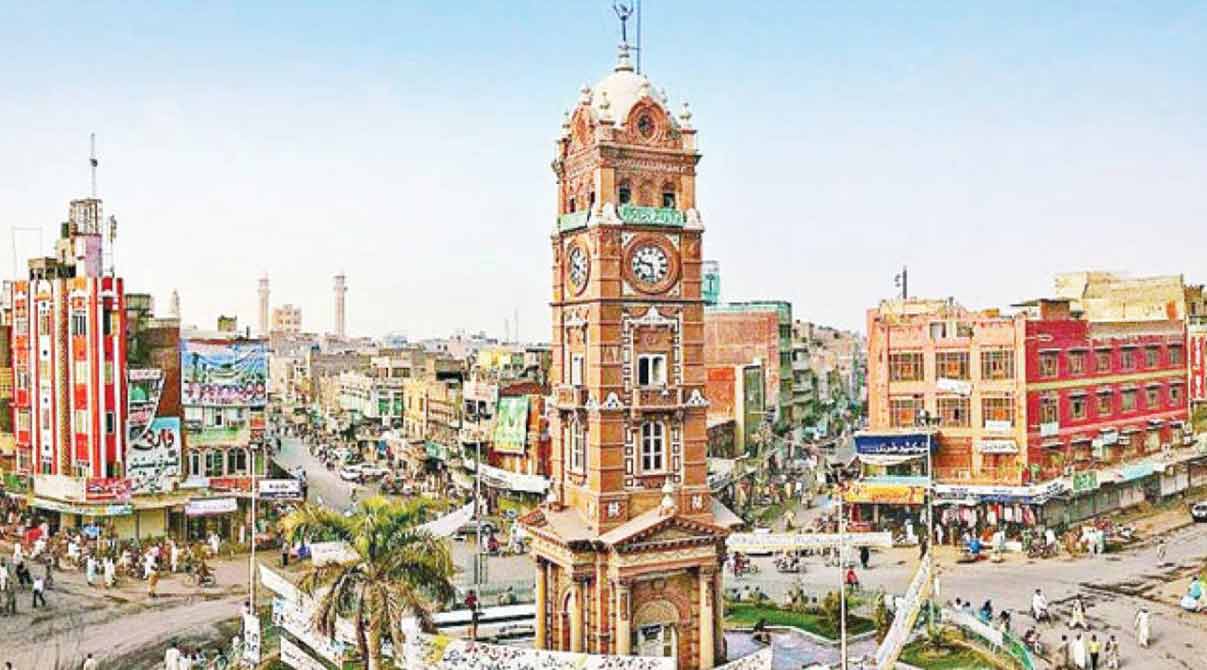
The textile industry in Faisalabad, while robust, faces several challenges that impact its operations, the local economy, and employment. Energy shortages are indeed a significant concern, as the industry relies heavily on consistent power supply. Unplanned power outages and energy crises can halt production, leading to financial losses and affecting employment rates in the city.
Moreover, the industry grapples with outdated technology and machinery, which hinders efficiency and competitiveness on the global stage. The lack of investment in modernizing the equipment not only affects production quality but also limits the types of products that can be manufactured.
Additionally, the textile sector in Faisalabad faces stiff competition from international markets. With global players investing in advanced technologies and sustainable practices. The local industry needs to keep pace to retain its market share. The challenges extend to labor and environmental compliance, essential factors for international trade and collaboration.
Related: Top 10 Amazing Places in Balochistan You Need to See
Future Prospects – Growth and Development
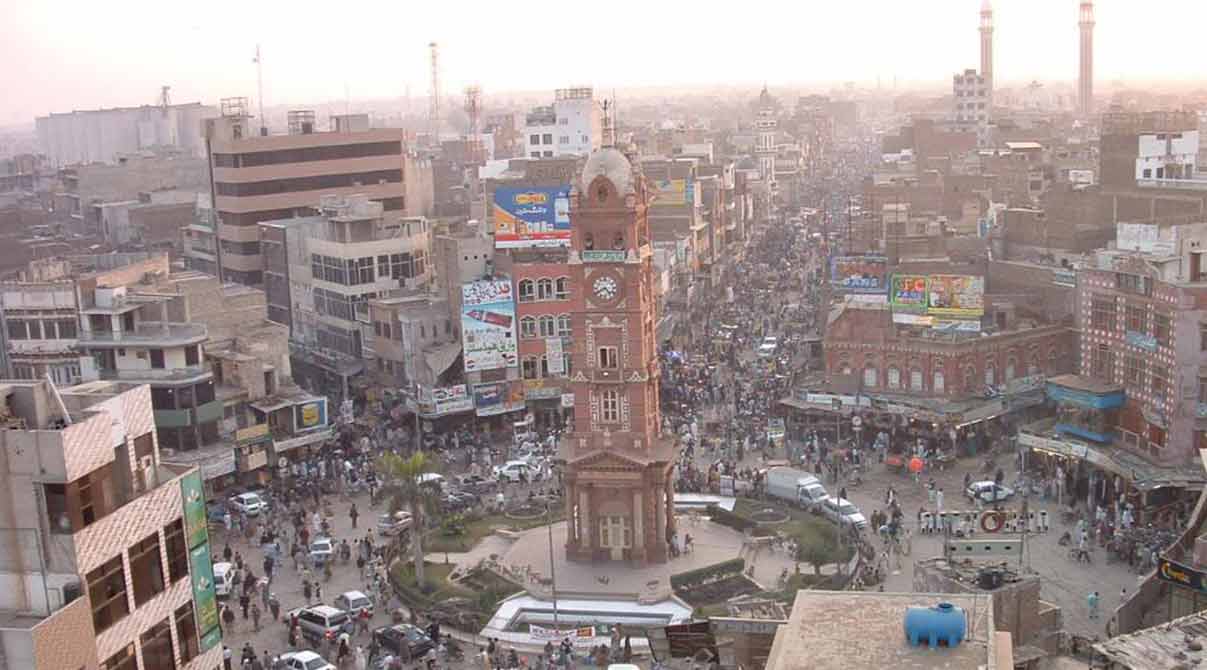
Despite these challenges, the textile industry in Faisalabad exhibits promising future prospects. There’s potential for substantial growth and development if the sector effectively navigates through its current challenges. Investment in technology is crucial. Adopting advanced and sustainable technologies can not only improve efficiency. They can also open doors to new markets concerned with sustainability and ethical production.
Furthermore, there’s a need for skill development and training programs for the workforce. Investing in human capital will improve the quality of products. It will also enhance the industry’s ability to innovate and adapt to market trends.
Public and private sector partnerships can also drive growth. Collaboration between the government and private companies can facilitate infrastructure development, policy formulation, and the establishment of research and development centers to foster innovation.
The Bottom Line
With a mosaic of traditions and customs, celebrated landmarks, and festivals that echo with joy and vibrancy. The city is a living testament to the diversity and inclusiveness that defines its spirit. Each event, landmark, and celebration adds a unique note to Faisalabad’s symphony of life. They make it a city that not only works but also celebrates and lives passionately.
The title “Manchester of Pakistan” encapsulates Faisalabad’s industrial might, historical richness, and cultural vibrancy. It is a city that mirrors the energy of Manchester while radiating its unique charm and character. This makes it an indispensable chapter in the narrative of Pakistan. Faisalabad, with its looms and fabrics, history and tales, celebrations and milestones, stands proudly as a city that is as industrious as it is vibrant, truly earning its nickname as the “Manchester of Pakistan”